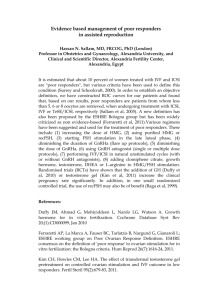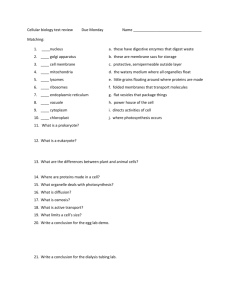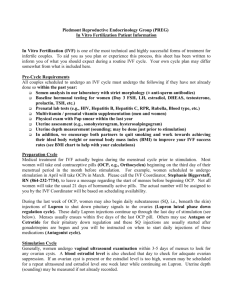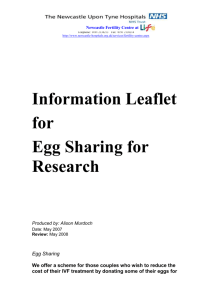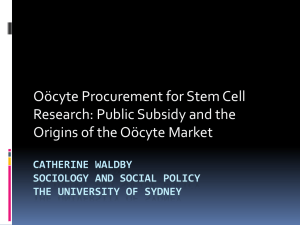Suzanne Parisian, M - Hands Off Our Ovaries
advertisement
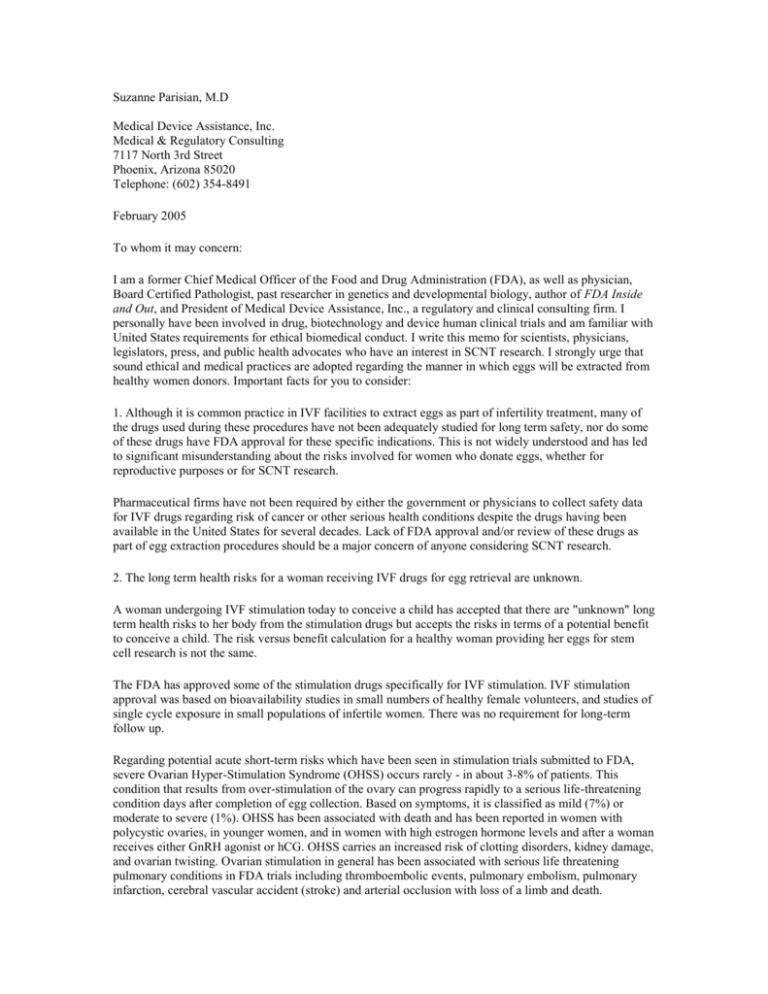
Suzanne Parisian, M.D Medical Device Assistance, Inc. Medical & Regulatory Consulting 7117 North 3rd Street Phoenix, Arizona 85020 Telephone: (602) 354-8491 February 2005 To whom it may concern: I am a former Chief Medical Officer of the Food and Drug Administration (FDA), as well as physician, Board Certified Pathologist, past researcher in genetics and developmental biology, author of FDA Inside and Out, and President of Medical Device Assistance, Inc., a regulatory and clinical consulting firm. I personally have been involved in drug, biotechnology and device human clinical trials and am familiar with United States requirements for ethical biomedical conduct. I write this memo for scientists, physicians, legislators, press, and public health advocates who have an interest in SCNT research. I strongly urge that sound ethical and medical practices are adopted regarding the manner in which eggs will be extracted from healthy women donors. Important facts for you to consider: 1. Although it is common practice in IVF facilities to extract eggs as part of infertility treatment, many of the drugs used during these procedures have not been adequately studied for long term safety, nor do some of these drugs have FDA approval for these specific indications. This is not widely understood and has led to significant misunderstanding about the risks involved for women who donate eggs, whether for reproductive purposes or for SCNT research. Pharmaceutical firms have not been required by either the government or physicians to collect safety data for IVF drugs regarding risk of cancer or other serious health conditions despite the drugs having been available in the United States for several decades. Lack of FDA approval and/or review of these drugs as part of egg extraction procedures should be a major concern of anyone considering SCNT research. 2. The long term health risks for a woman receiving IVF drugs for egg retrieval are unknown. A woman undergoing IVF stimulation today to conceive a child has accepted that there are "unknown" long term health risks to her body from the stimulation drugs but accepts the risks in terms of a potential benefit to conceive a child. The risk versus benefit calculation for a healthy woman providing her eggs for stem cell research is not the same. The FDA has approved some of the stimulation drugs specifically for IVF stimulation. IVF stimulation approval was based on bioavailability studies in small numbers of healthy female volunteers, and studies of single cycle exposure in small populations of infertile women. There was no requirement for long-term follow up. Regarding potential acute short-term risks which have been seen in stimulation trials submitted to FDA, severe Ovarian Hyper-Stimulation Syndrome (OHSS) occurs rarely - in about 3-8% of patients. This condition that results from over-stimulation of the ovary can progress rapidly to a serious life-threatening condition days after completion of egg collection. Based on symptoms, it is classified as mild (7%) or moderate to severe (1%). OHSS has been associated with death and has been reported in women with polycystic ovaries, in younger women, and in women with high estrogen hormone levels and after a woman receives either GnRH agonist or hCG. OHSS carries an increased risk of clotting disorders, kidney damage, and ovarian twisting. Ovarian stimulation in general has been associated with serious life threatening pulmonary conditions in FDA trials including thromboembolic events, pulmonary embolism, pulmonary infarction, cerebral vascular accident (stroke) and arterial occlusion with loss of a limb and death. Risks of the egg retrieval procedure, although rare, include death, respiratory or cardiac arrest, brain damage, paraplegia, paralysis, loss of function of a limb or organ, hemorrhage, allergic reaction, and infection Bleeding or other injuries which occur during retrieval may require an invasive surgical procedure to correct and could affect future fertility. Regarding the unknown long term risks, studies to date have not ruled out a possible link between stimulation drugs and an increased risk of ovarian cancer. All stimulation drugs are Pregnancy X - which means they are contraindicated for use in women that are pregnant due to a lack of information regarding the safety of these drugs during pregnancy. As a scientist, physician, former FDA official, and clinical trial consultant, I understand why some have expressed enthusiasm for SCNT. However, as a physician, I cannot condone SCNT at the expense of a woman's health without giving her an opportunity for adequate informed consent and establishing a mechanism to ensure her safety. Women, scientists, policy makers, physicians, and funding organizations should require that pharmaceutical firms first disclose the actual FDA approved indications for drugs as well as all available safety data before multiple egg extraction from healthy female donors is pursued. All drug data should be reviewed by a neutral, knowledgeable, and independent oversight body whose sole purpose is to protect the safety and rights of healthy women wishing to participate in egg donation. Once such basic drug safety data have been gathered and reviewed, and a regulatory framework and monitoring system are in place, the risks and benefits of SCNT for healthy women can be better assessed. In the meantime, extraction at the time of an ovariectomy or a tubal ligation offers a far safer and more ethical approach to begin collecting eggs for SCNT research. Even single egg extraction with natural cycling (no hormonal manipulations of the ovary) would be safer than conventional egg extraction procedures. Additionally and importantly, any woman willing to provide eggs for research should have her own physician - someone not involved in any way with the research or the research institution and whose only job is to look out for the well-being of the woman. Finally, there needs to be a mechanism in place for long-term follow-up regarding the health of women egg donors. This follow-up must be mandatory, and also under the aegis of the independent monitoring body. Such follow-up of the health of IVF donors has NOT yet been conducted by pharmaceutical firms or IVF physicians despite the long availability of these drugs and technology in the United States. In conclusion, there is an unfortunate and false assumption of the public, legislators, press and physicians that all current IVF stimulation drugs have been scientifically recognized as "safe" by the FDA and suitable for use in healthy women for multiple egg extraction. That simply and sadly is not correct. From a purely practical perspective, those promoting SCNT research may be unknowingly tackling a far more costly and serious health burden by allowing the expanded use of current IVF stimulation drugs for SCNT. It is wiser to first require pharmaceutical firms supplying the IVF drugs to provide adequate long term safety data. It is in the best interests of everyone - including patients, researchers and potential egg donors - for all women contemplating donating their eggs to be treated according to the highest ethical and medical standards, and for their rights and safety to be protected. Thank you, Suzanne Parisian, MD


